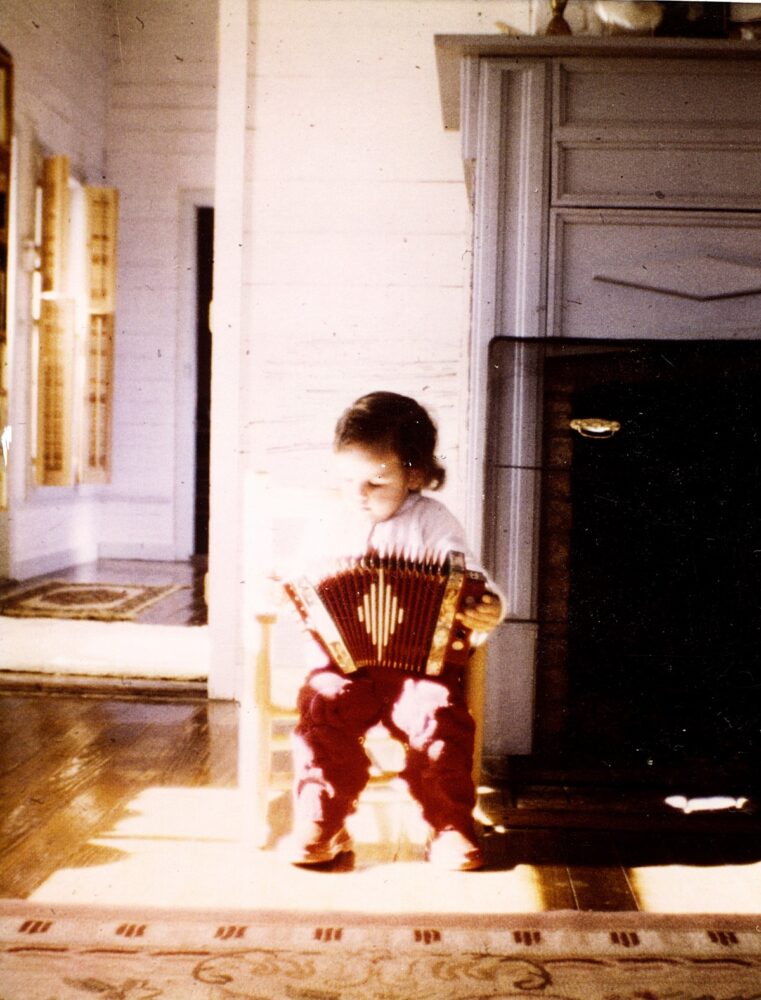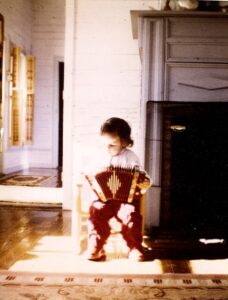Fais Do Do: Louisiana Lullabies
A collection of songs for children in Louisiana French
Published: November 30, 2021
Last Updated: June 1, 2023

Ann Savoy
Cozy images add to the book’s appeal.
The two musicians have a long history of studying folk music. Vidrine once coordinated folk arts and music for the National Park Service, and Savoy studied music and French and published tomes on Cajun music, including two volumes of Cajun Music: A Reflection of a People.
With the grant, they searched through numerous song collections at the Center for Louisiana Studies at the University of Louisiana at Lafayette. They perused the Alan Lomax recordings made of Cajun and Creole music in the early part of the twentieth century, Irène Thérèse Whitfield’s book Louisiana French Folk Songs, and a collection compiled by Louisiana folklorist Catherine Brookshire Blanchet, who recorded traditional songs of rural southern Louisiana.
“We worked really hard going through these old collections,” Savoy explained. “It was a huge project and we dug up an enormous amount of material.”
“We dug and dug and dug and found so many things,” Vidrine said.
The result was a massive repository of material, including unknown African American songs and Creole music from 1800s New Orleans. The two then divided up their finds into funny songs and lullabies. They incorporated several Cajun and Creole children’s songs, lullabies, and dances as part of Lapin, Lapin, a children’s album the Magnolia Sisters produced in 2006.
The band—composed of Vidrine, Savoy, Anya Burgess, and Lisa Trahan—then returned to their typical folklorist genre, producing two albums nominated for Grammy Awards. The rest of those old unearthed songs became, for a time, forgotten.
And then, the daughters of both Vidrine and Savoy became pregnant.
“We had always played dancehall music,” Savoy explained of the Magnolia Sisters. “But now, we thought, ‘What about the other side?’ Jane’s daughter and my daughter had babies and we wanted them to have lullabies. Plus, both of them were living in France, and we wanted them to have music in French.”
The two pulled out the two-hundred-plus song collection they established in their research and chose eighteen children’s songs, ballads, and lullabies for a book titled Fais Do Do: Louisiana Lullabies. The twenty-eight-page paperback includes French lyrics, translations to English, music transcriptions, and guitar chords to allow readers to sing and perform the songs, plus learn background about the tunes.
The paperback comes with a CD created by Valcour Records, a Louisiana record label owned by Savoy’s son, Joel Savoy. Vidrine and Savoy sang vocals, with Savoy on backup guitar while Joel Savoy added violin, mandolin, and banjo. Lafayette educator and classical musician Molly Goforth performed on the cello, as did Natchitoches musician Caleb Elliot. Another Savoy son, Grammy-winning accordionist Wilson Savoy, offered a piano solo. The songs came together at Dave’s Lonesome Whistle Recording Studio in Lafayette, with some mixing performed at Studio SavoyFaire in Eunice.
The soft, sweet songs on Fais Do Do echo what Cajun and Creole mothers sang to children to help them sleep, either at home or at house dances known as fais-do-dos, when parents would dance the night away once the kids fell asleep.
“It crosses the Cajun and Creole boundaries,” Savoy said of the music. “It’s not dancehall music—it’s the gentler side of Cajun and Creole music.”
Even the artwork is comforting. The cover and inside photo illustrations feature children riding horses, hosting tea parties, and playing with wooden toys and animals.
The soft, sweet songs on Fais Do Do echo what Cajun and Creole mothers sang to children to help them sleep, either at home or at house dances known as fais-do-dos, when parents would dance the night away once the kids fell asleep.
“We dug out these old photos, mostly from our families, and I hand-tinted them,” Savoy said, adding that her husband Marc Savoy’s cousins grace the cover.
Some photos in the book are even closer to home. Vidrine’s daughter Emily is seen reading in a rocking chair. Wilson Savoy as a baby lies asleep in another photo.
The book debuted in late 2019 and was an instant hit at baby showers. “Something for women, finally,” Savoy said. “It’s great for young moms, a gift for them. It helps them continue their culture while raising their child. And you can teach the songs to kids. Anybody with a basic guitar knowledge can sing these songs.”
Fais Do-Do soon sold out of its initial print run, but Savoy and Vidrine have been keeping the project alive.
“We were just going to let it go away, when we went through the initial printing,” Savoy said. “But it’s been reprinted twice.”
The album portion and individual songs may be downloaded off sites such as Amazon and Valcour Records, but Savoy champions the beauty of the book in its print form.
“We think a baby needs to hold the book,” she says. “I guess I’m old-fashioned, but I think you need to hold a book in your hands.”
To hold your own book in your hands, Fais Do Do: Louisiana Lullabies is available through the Magnolia Sisters website, through Valcour Records, or at AnnSavoy.com. It can also be purchased at Sola Violins, Beausoleil Books, and the Acadian Cultural Center in Lafayette; The Kitchen Shop in Grand Coteau; Savoy Music Center and Beaucoup store in Eunice; and the Louisiana Music Factory in New Orleans.
Cheré Coen traces her French roots back three hundred years in Louisiana. Although she doesn’t speak French fluently like her ancestors, she loves the old Cajun and Creole songs.
Sound Advice is funded in part by a grant from the New Orleans Jazz & Heritage Foundation.

